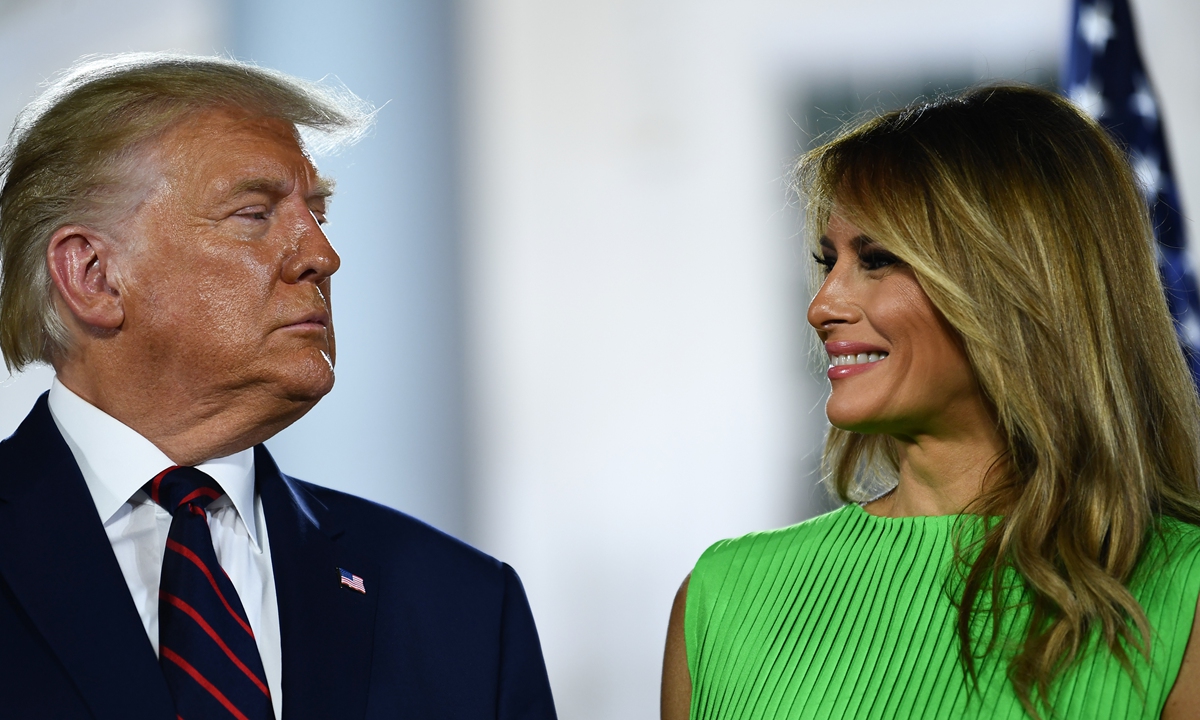‘China card’ in Trump speech not yet swaying swing voters
By Xie Wenting and Wang Qi Source: Global Times Published: 2020/8/28 15:05:55 Last Updated: 2020/8/28 23:53:04
US mired in domestic problems ‘whoever wins’

US First Lady Melania Trump smiles at her husband, President Donald Trump, at the conclusion of the final day of the Republican National Convention, at the White House on Thursday in Washington DC. Photo: VCG
By calling the novel coronavirus the "China virus," playing blame-shifting games to distract attention from his administration's failure in handling the epidemic and the sluggish economy, while at the same time touting a twisted reality with rhetoric about his personal achievements, President Donald Trump delivered his GOP nomination speech to run for a second term on Thursday local time, one week after Joe Biden accepted the Democratic Party's nomination, marking the "official" opening of the fall election season in the US.
Addressing more than 1,000 people at the White House South Lawn - without nucleic acid tests conducted and mostly mask-free - Trump mentioned China more than 10 times, including calling COVID-19 the "China virus," touting his efforts to contain China and claiming China wants Biden to win. In comparison, Biden only mentioned China once in his speech last week.
Experts told the Global Times on Friday that playing the "China card" is a timeworn tactic that Trump also used four years ago in his first election campaign; in fact, antagonizing China is his way of creating an enemy in an attempt to appease his base.
"He created conflict both within and outside the US four years ago, which brought him a surprising victory. So, this time around, he wants to replicate such success," Li Haidong, a professor at the Institute of International Relations of the China Foreign Affairs University, told the Global Times on Friday.
"Trump wants to reinforce his loyal supporters and impact swing voters by his repeated warnings of 'fear' in relation to China. But this has so far not impacted those swing voters," Diao Daming, a US politics expert and associate professor at Renmin University of China in Beijing, told the Global Times on Friday.
Trump continues to trail Biden by an average of 7.7% in the polls. But an earlier poll taken after the Democratic National Convention on August 24 showed that Biden was ahead by an average of 10 percent.
Analysts said it is still hard to predict who will win, and the three presidential debates may not be in Biden's favor.
"If Biden leads by more than 10 percent after the debate on October 22, it is almost certain he will beat Trump. If the gap is below 5 percent, Trump still has a chance to be reelected, Diao said.
But no matter the result, there is a consensus in Chinese society that neither of the candidates would be soft on China, analysts said.
"Being tough on China won't change no matter who wins. The difference is whether relations will turn into confrontation between civilized people, or confrontation between civilized people and barbarians," Li said.
Three cards to play
Over the past four days of the GOP convention, Trump's cronies portrayed him as empathetic, caring for women and black communities. However, the country has continued to wrestle with a deadly racial division. The convention also amplified the threats of lawlessness and violence under potential Democratic leadership.

File photo: AFP
In Thursday's speech, Trump even claimed he has done "more for the African American community than any other president since Abraham Lincoln."
However, analysts said that the US is moving backwards on human rights, and the current situation could be even worse than in 1968, when protests swept Wisconsin after a police officer shot Jacob Blake in Kenosha last week. The incident happened after George Floyd's death due to police cruelty, which sparked nationwide protests against racism in the US.
"To win the election, some politicians even made extreme remarks that disregard the truth," Li said.
Sun Chenghao, an assistant research fellow at the Institute of American Studies of the China Institutes of Contemporary International Relations, told the Global Times on Friday that Trump plays three cards in the election. The first is to accuse the Democratic Party of being socialists, and that Biden will turn the US into a socialist country. The second is to bash Biden's policies, and the third is to play the "China card."
Usually, the nomination speech is about mapping out a policy for the country in the next four years, but diplomacy is not a hot issue. However, Trump's tactic is to link China with US problems, including poor epidemic control and economic performance, analysts said.
"These tactics are useful to consolidate his base, but are not so useful to win swing voters," Sun said.
Asked about Trump's speech in the convention that if Biden wins, China will "own" the US, and that if Trump wins, he will move American businesses from China to the US, at Friday's regular media briefing, Chinese Foreign Ministry spokesperson Zhao Lijian said the US election is American internal affairs, which we cannot comment on.
On China issues, Zhao said China urged the US to look at bilateral relations in an objective way, and work with China to manage their differences. And as to moving businesses out of China, he said it shows some US politicians put party and personal interests above national interests, which is neither feasible nor realistic.

An ambulance sits outside the US Capitol in Washington, DC, Monday. Photo: AFP
In Biden's speech last week, which he delivered to a virtual audience, he attacked Trump's failures in handing the COVID-19 crisis and racism, saying the US was in a "season of darkness."
Biden did not talk much about China. This may partly be because Trump has more say on this topic, and he may want to leave some room to adjust to Trump's China policies if he gets elected, Sun said.
The tough tone on China can be seen in the Democratic Party platform. Compared to the platform released in 2016, the 2020 version removed the "one-China" principle, and said that "Democrats are committed to the Taiwan Relations Act and will continue to support a peaceful resolution of cross-Straits issues consistent with the wishes and best interests of the people of Taiwan."
Li said that Biden and Trump will choose different tactics on being tough on China. Biden could be more "sophisticated" in his tactics.
Diao said what Biden is doing is to reinforce his base. He noted that both parties have not made much effort to appeal to swing voters so far.
More China topics are expected to be brought up in the next three months, including the topics of Taiwan and South China Sea. Diao believes that the Trump administration will further provoke China, forcing China to escalate its response, thus creating a "China threat" narrative.
"We don't need to follow Trump's steps. China should refrain and insist on a non-escalation and reciprocal response," he said. The strategy of the Trump administration is to make everything a security issue."
In Li's eyes, what will happen in the next three months is important for China-US relations, and whoever wins the election will have profound global implications.
He pointed out some US politicians' deeds are against the American creed that the country's founding fathers once pursued.
"The US is still strong, but it's now pathetic and miserable. The country will be mired in deep confrontation for many years. This situation will possibly continue no matter who wins," Li told the Global Times.
Posted in: AMERICAS